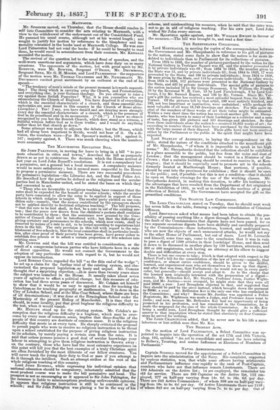THE MANCHESTER EDUCATION BILL.
Sir 7oine PAKINGTON, in moving for leave to bring in a bill "to promote education in cities and towns," described the bill as purposely drawn so as not to contravene the decision which the House arrived at last year on Lord 'John Russell's resolutions. It is not a compulsory but a permissive, not a general but a local measure. A compulsory measure would be more satisfactory; but it seemed more respectful to the House to propose a permissive measure. There are two successful precedents for permissive legislation—the Libraries Act, and the Rural Police Act. He described how the parties he defined as the religious and the secular parties had in Manchester united, and he stated the bases on which they had consented to act.
"Those who are favourable to religious teaching have consented that the rates shall be expended for the benefit of secular schools; while the secular party have consented to allow the rates to be applied in support of those schools in which religion is taught. The secular party yielded on one condition only—namely, that the money contributed by the ratepayers should not be applied directly to doctrinal religious teaching." The bill proposes, "that the rate to be laid shall, in fact, be a rate in aid of the existing system ; that the pence now drawn from the children's pockets shall continue to be contributed by them ; that the assistance now granted by the Committee of Council shall not be interfered with ; but that the difficulty of giving certainty and permanence to the schools, which now exists, shall be removed by means of a rate in aid, to be levied according to regulations laid down in the bill. The only provision in this bill with regard to the establishment of free schools is that the local committee shall in particular localities, after clear proof of their poverty has been given, have power either to establish free schools or to admit a certain proportion of free scholars into existing ones."
Mr. COWPER said that the bill was entitled to consideration, as the result of a compromise between parties who have hitherto been in a state of direct opposition. He would not commit the Government to the adoption of any particular course with regard to it, but he would not oppose its introduction.
Lord ROBERT CECIL regarded the bill "as the thin end of the wedge "; he set up a claim for the further trial of the existing system, and cha racterized the proposed legislation,as hasty and unjust. Mr. COBURN thought Met a surprising objection.,at is more than twenty years since the subject was launched in the House. It usually takes about seven years of agitation to effect a political change, but this measure of education has had three seven years of discussion. Mr. Cobden set himself to show that it would be as easy to appoint a time for teaching the Catechismfas for teaching geography or mathematics. It is done in. the City of London School, and at the Blue Coat School, where there are boys Of all denominations ; it was done at the Birmingham School under the Mastership of the present Bishop of Manchester.. It is time that we should, in some locality, put that great bugbear the religious difficulty to the test, when it would vanish.
Mr. HENLEY stood up for the existing system. Mr. Cobden's as sumption that the religious difficulty is a bugbear, which may be overcome by every man of common sense, implies that three-fourths of the people of this country are destitute of common sense. It is the religious difficulty that meets us at every turn. He sharply criticized the proposal to permit pupils who were to receive no religious instruction to be thrust upon a school established for the purpose of giving religious instruction to its scholars, by merely paying a certain sum from the rates. It is Said that unless persons possess a good. deal of secular knowledge your labour in attempting to give them religious instruction is thrown away : on the contrary, those who have had the most extensive experience on this point will tell you that the best examples of a truly Christian spirit are often furnished by the most illiterate of our fellow creatures. You will never teach the young their duty to God or man if you attempt to do it through the intellect. Such an attempt strikes at the root of the whole religions tete-bine of this country. Lard Joint RUSSELL, while expressing his individual opinion that
national education should be compulsory, reluctantly admitted that the most prudent course was to make the bill permissive and local. The Prospect is not so encouraging as it appeared to Sir John Pakington, for the measure is liable to misconceptions producing unfavourable opinions. It appears that religions instruction is still to be continued in the schools; and Sir John Pakington was placing a bar in the way of his scheme, and misdescribing his measure, wheat he said that the rates were not to go in aid of religious teaching. For his own part, Lord John wished Sir John every success.
Mr. ELADVIELD spoke against, and Mr. Wim.mikt EWART in favour of the measure.—The bill was brought in, and read a first time.


























 Previous page
Previous page